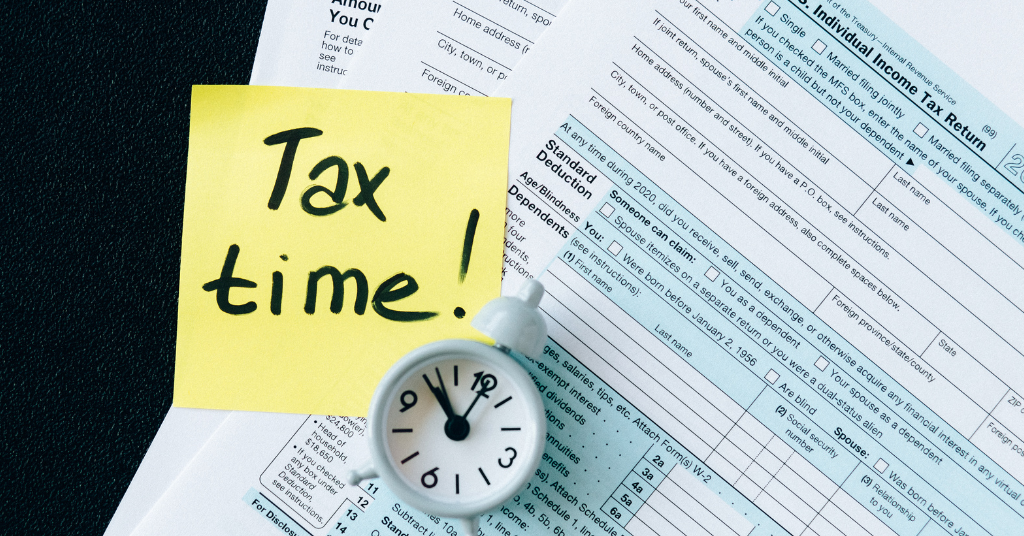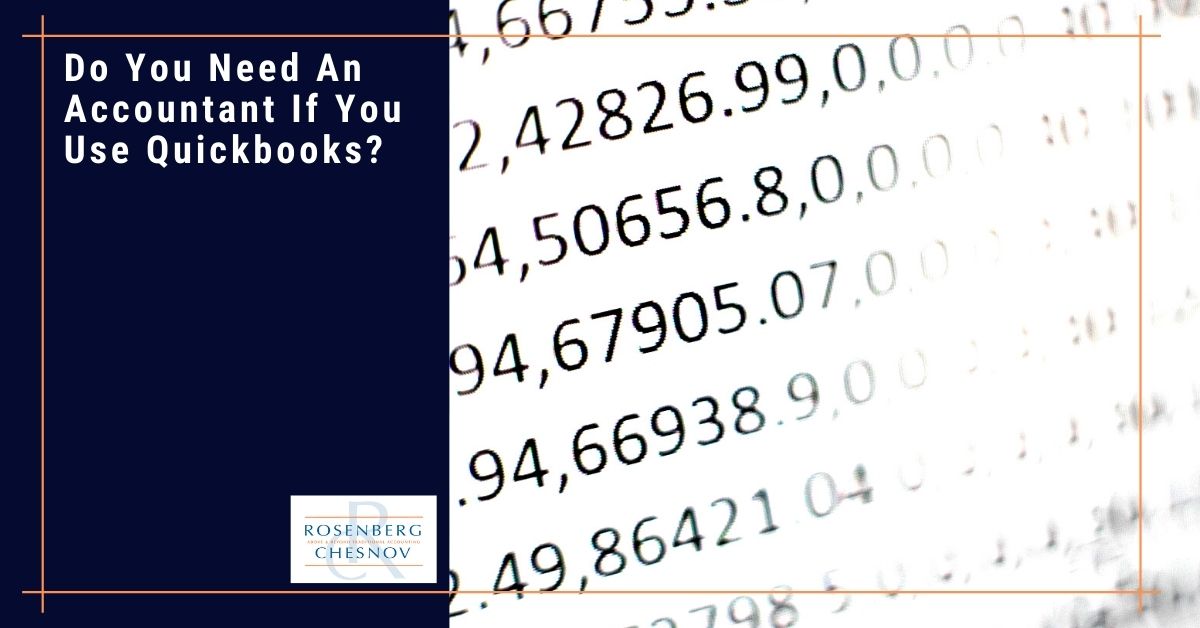

Maximize Your 2024 Refund: Tax Breaks You Might Be Missing
Category: Accounting
There was a time when keeping the books meant paper ledgers, sharp pencils, and a lot of record-keeping. It was a laborious task.
With software like QuickBooks, the bookkeeping part of running a business is more accessible and much of it is automated.
For example, all of the double-entry and entering expenses that used to take hours now take minutes.
So, if you are using QuickBooks, do you even need an accountant?
In reality, while bookkeeping used to take up a lot of time, it has always been a small part of accounting. Bookkeeping was the work that allowed accountants to do the thinking work of helping companies grow and prosper.
You don’t always need an accountant, but if you run a business, you should certainly look into it. Even if you don’t think you need an accountant, 89% of small businesses surveyed by Intuit say they are more successful with an accountant by their side and giving advice.
Yes, I am biased, but I see how we help our clients manage their business, find peace of mind and save money. In the simplest of terms, these seem like the best reasons to hire an accountant.
In this post, I talk about what bookkeeping is and then go through the services you should expect from your accountant. I then give you some idea as to when you may NOT need an accountant.


Bookkeeping is the process of “keeping the books.” The books are the records of business transactions, income, and expenses. They used to be actual books with handwritten entries; these days, the book is a database.
Keeping the books is an integral part of running a business. No matter how small your business is, you want some record of income and expenses. This is important for paying taxes, knowing how much money you have available, raising capital, getting loans, and just knowing what you are spending your money on.
Many entrepreneurs and freelancers rely on bank statements, 1099’s, and guesstimates to estimate their financial situation, but this creates many problems, from overdrawn accounts to costly IRS audits.
Software like QuickBooks is excellent at making the bookkeeping process easier. You can easily download and categorize transactions so that you are always on top of your financial situation.
Accountants start with the books. Most accounting firms (including Rosenberg Chesnov) will do the books for you. Accountants manage QuickBooks so that you don’t have to.
But the books provide only the basic information that accountants need to help you run your business. Your accountant should provide strategic advice and support that enables you to run your business.
A good accountant will:
These include:
The list above is a long list of “things an accountant can do for you.” So, the question is, when do you need those things? You should consider hiring an accountant when you:
As I said in the introduction, 89% of small businesses state they are more successful due to working with an accountant. That is a significant number and something worth considering when making your decision – regardless of your situation.
But there are some cases where you may be able to get by without an accountant:
Your business is a hobby. If your business is truly a hobby that brings in a small amount of money on the side, you likely do not need the services of an accountant. Use your bookkeeping software to keep track of expenses and income (don’t wing that part), but very small businesses that are not on a growth track can stick with the default settings and operate without strategic advice.
You are a freelancer. If you are a freelancer with only a few clients, then you may be able to manage your financial situation yourself. You may want to talk to an accountant to ensure you have the correct business entity and perhaps get some setup advice. But if all you are doing is managing a few simple transactions you may be able to skate by without professional help.
Your situation is generally straightforward, and you know what you are doing. If your tax situation is simple, your business is in a steady-state, and you know exactly what you need and when then you may be able to wing it without an accountant.
But the truth is that even in situations where you may be able to “wing it” without an accountant, you should consider carefully the cost of mistakes and the time you put into accounting. Often your accountant can help you reduce the time, effort, and annoyance of running a business while saving you enough money to pay for themselves. So even in the simplest of situations, you might want to consider talking to an accountant.
Though, admittedly, as I said at the beginning, I am biased!
If you are a client and would like to book a consultation, call us at +1 (212) 382-3939 or contact us here to set up a time.
If you aren’t a client, why not? We can take care of your accounting, bookkeeping, tax, and CFO needs so that you don’t have to worry about any of them. Interested? Contact us here to set up a no-obligation consultation.
Interested in receiving updates in your mailbox? Check out our newsletter, full of information you can use. It comes out once every two weeks and you can register for it below.


Category: Accounting


Category: Accounting


Category: Accounting
Send us a message and we will contact you as soon as possible.
Jeff Coyle, CPA, Partner of Rosenberg Chesnov, has been with the firm since 2015. He joined the firm after 20 years of business and accounting experience where he learned the value of accurate reporting, using financial information as a basis for good business decisions and the importance of accounting for management.
He is a diligent financial professional, able to manage the details and turn them into relevant business leading information. He has a strong financial background in construction, technology, consulting services and risk management. He also knows what it takes to create organizations having built teams, grown companies and designed processes for financial analysis and reporting.
His business experience includes:
Creating and preparing financial reporting, budgeting and forecasting.
Planning and preparation of GAAP and other basis financial statements.
Providing insight on financial results and providing advice based on those results.
Jeff also has a long history of helping individuals manage their taxes and plan their finances including:
Income tax planning and strategy.
Filing quarterly and annual taxes.
Audit support.
General financial and planning advice.
Prior to joining the firm in 2015, Jeff was in the private sector where he held senior financial and management positions including Controller and Chief Financial Officer. He has experience across industries, including construction, technology and professional services which gives him a deep understanding of business.
Jeff graduated from Montclair State University, he is a CPA and member of the American Institute of Certified Public Accountants, New York State Society of Certified Public Accountants and New Jersey State Society of Public Accountants.
Jody H. Chesnov, CPA, Managing Partner of Rosenberg Chesnov, has been with the firm since 2004. After a career of public accounting and general management, Jody knows the value of good financials. Clarity, decision making, and strategy all start with the facts – Jody has been revealing the facts and turning them into good business results for more than three decades.
He takes a pragmatic approach to accounting, finance and business. His work has supported many companies on their path to growth, including helping them find investors, manage scaling and overcome hurdles. His experience and passion for business reach beyond accounting and he helps businesses focus on what the numbers mean organizationally, operationally and financially.
He has a particular expertise in early-stage growth companies. His strengths lie in cutting through the noise to come up with useful, out of the box, solutions that support clients in building their businesses and realizing their larger visions.
Prior to joining the firm in 2004, Jody was in the private sector where he held senior financial and management positions including General Manager, Chief Financial Officer and Controller. He has experience across industries, which gives him a deep understanding of business.
Jody graduated with a BBA in Accounting from Baruch College, he is a CPA and member of the American Institute of Certified Public Accountants and New York State Society of Certified Public Accountants.
In addition to delivering above and beyond accounting results, Jody is a member of the NYSCPA’s Emerging Tech Entrepreneurial Committee (ETEC), Private Equity and Venture Capital Committee and Family Office Committee.
He is an angel investor through the Westchester Angels, and has served as an advisor for many startup companies and as a mentor through the Founders Institute.